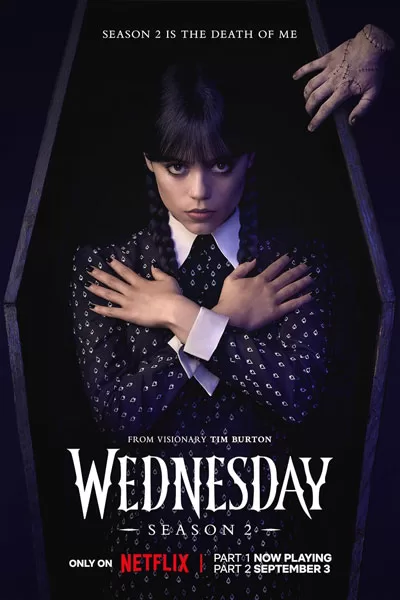
- Starring
- Jenna Ortega, Hunter Doohan, Emma Myers
- Creators
- Alfred Gough, Miles Millar
- Rating
- TV-14
- Genre
- Comedy, Fantasy, Mystery
- Release date
- Aug 6, 2025
- Where to watch
- Netflix
Overall Score
Rating Overview
Rating Summary
In the first half of Season 2 of Wednesday, Wednesday Addams returns to Nevermore Academy, tackling a new supernatural mystery involving murders and a shadowy figure. She uncovers a hidden conspiracy tied to outcast powers, navigates family secrets, and faces old enemies, all while trying to protect her friends.
Wednesday Review (S2: Part 1)
When season 1 of Wednesday came out, I was still building Worth it or Woke, and since I’m a straight adult man, I had no desire to watch it whatsoever. However, I have a sneaking suspicion that it would have significantly improved my enjoyment of these four episodes, because very little else could.
This Addams Family spinoff has some fundamental problems, and Wednesday herself is chief among them. In the original, she was a precocious young girl whose hobbies were appropriately Adams-like, but she wasn’t cruel. In the 90s films, Christina Ricci played a sadistic and twisted child who would just as soon murder her brother to note the direction of his twitches as anything, but she wasn’t spiteful or petty. More importantly, the films were in on the joke, and every twisted event, whether perpetrated by her or someone else, was done tongue-in-cheek.
In Wednesday, Jenna Ortega plays a cold and snide jerk who no one in their right mind would ever want to be around, and it sets the tone for the series. So, every time someone treats her like a friend or is desirous of her companionship, her snarky unpleasantness puts the lie to the show, breaking its reality. That those moments in between murders and the show’s other various horror segments are near the level of Disney’s Descendants (though blessedly without the insipid music) helps nothing.
With the exception of Steve Buscemi, who doesn’t know how to give a bad performance, and Jenna Ortega, whose performance is solid despite playing an unlikable douché, the rest of the cast is just terrible. Catherine Zeta-Jones’s Morticia is sleepy and ordinary, relying on lazy gags to take the place of the character’s traditional sultry gothic fatale quality. Luiz Guzmán’s Gomez is as miscast as it is poorly written. Unlike any other iteration, this Addams patriarch is now a literal joke whose only purpose is to occasionally stumble into a scene and do or say something ridiculous. This wouldn’t be as egregious were Guzmán’s acting peculiarities at all aligned with the blissfully casual charm written into the character’s DNA (until now).
The “teens” do their best to work within the confines of such a mediocre script, and the actors, although not actual teens, are still young, and their inexperience shows. Though, to be fair, no one could much improve on Tim Burton’s cruise-control storytelling or co-dependent aesthetic. It was interesting 30 years ago, but even goth kids have to grow up and throw their Hot Topics membership card away eventually. An almost 70-year-old (and very wealthy) man still dressing up like an Edgar Allen Poe poem and whining about existential inequities is depressing in all the wrong ways.
Season 2 – Part 1 of Wednesday is neither neat nor sweet, but altogether ooky. Skip it.
WOKE REPORT
DEI U
- Like most modern programs for teens, the diversity is comically and artificially inflated, though not just at the school, but also in the small rural town that neighbors it.
- Last season’s skinny, white male sheriff has been traded in for a morbidly obese black woman.
- Wednesday’s roommate’s white boyfriend has been traded in for an ethnically ambiguous but politically correct, diverse one.
Gómez Addams el Castrada
- The Addams Family patriarch has been relegated to the show’s resident dancing monkey. He does little more than occasionally, and briefly enters a scene to say something ridiculous or make a sexual overture toward Morticia before exiting once again.
- In the first episode, Morticia and Wednesday have a conversation about how Morticia is actually the head of the family. She tells her, “I let your father think he’s in charge of the family.” He then does something stupid to establish his narrative role as the modern useless father, so that the two women can share a knowing look with one another.
- Morticia’s mother tells her that “a woman should always have a portfolio,” meaning that Morticia is a fool for allowing Gómez to take care of her financial needs.
It’s Whining Men
- Pugsley is there, not to be a fun and silly side character whose innocence is a fun juxtaposition for his macabre Addamsness, but as a target and punching bag for Wednesday’s cruelty.
- None of the men in the show is portrayed particularly well. Even Enid’s new ethnically acceptable 6′ tall beau is clearly subservient in the relationship.
- There’s a harrowing scene involving the two of them (both werewolves, by the way) and he has to collect himself afterwards, telling us that since his initial transformation, he’s suffered from “wolf whimpers” (i.e., werewolf panic attacks).
White Boy Blues
- In fact, the only white male who is portrayed as anything other than a fool, self-serving, or a (metaphorical) monster is Enid’s gorgon, ex-boyfriend, who simps for her through most of the four episodes.
- There’s a short scene in which an impromptu party is taking place. There are groups dancing and groups making out, etc. However, exclusively the white boys are brawling with one another.
- In a later episode, we’re introduced to a primarily white group of Boy Scouts with a cartoonishly militant leader who tosses in some lite misogyny with his more generally focused insults.
- He’s a bit much, but he in no way deserves to have his which is meant to be a comically satisfying dose of schadenfreude.Spoilerhead ripped open by a zombie,
- He’s a bit much, but he in no way deserves to have his
The One Place
- The one group for which a diverse cast would make sense, the TSA agents at a major metropolitan airport, are all white. Why, you ask? Because they are the “comically” foolish variety, and we couldn’t possibly portray minorities as silly.
Our Father, The Sister
- A black woman, dressed as a Catholic priest, presides over a funeral.
James Carrick
James Carrick is a passionate film enthusiast with a degree in theater and philosophy. James approaches dramatic criticism from a philosophic foundation grounded in aesthetics and ethics, offering insight and analysis that reveals layers of cinematic narrative with a touch of irreverence and a dash of snark.


One comment
Sweet Deals
August 25, 2025 at 4:20 pm
Regarding your candid admission that you may not be a member of the program’s intended target audience, I would ask if you’ve ever recruited anyone who was closer to the target audience to watch the program with you and provide a second opinion.
That said, I personally do not find cruelty to be funny. I can understand the appeal of cartoonish roughhousing where characters playfully mock each other, beat each other up or pull pranks but no one gets seriously hurt, and I can understand when a giant monster eats up annoying characters who likely deserve what they’re getting. But as someone who has been on the receiving end of plenty of bullying as a child, teen and adult, cruelty with the intent to harm holds no appeal to me. Even when I was a teenager, I could not watch contemporary shows such as Disney’s Wizards of Waverly Place or Nickelodeon’s iCarly because I found myself hating the protagonists more than I would cheer them on. For decades, it seems like television shows were telling teenage girls that cruelty was a form of empowerment: if you were the self-proclaimed heroine, you could do whatever selfish thing you wanted because you were better than everyone else, and everyone else was either too weak, stupid or undeserving to stop you.
If they haven’t already, someone needs to course-correct and tell these people that if you think bullying makes you powerful and special, odds are you are not the hero. If all the boys are running scared from you, it’s not a sign of respect. It’s very likely that you’re the mean girl everyone secretly hates.